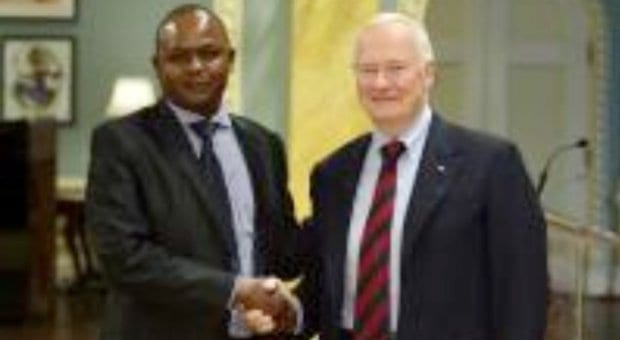Uganda’s strict new anti-gay law may be “a mistake,” the country’s high commissioner to Canada admits, but it shows that Uganda needs more help than punishment from developed countries.
“These are mistakes that we are making, democratically. Let this be a wakeup call, that more help is still needed,” John Chrysostom Alintuma Nsambu told Xtra on Feb 28.
President Yoweri Museveni signed the law against “aggravated homosexuality” on Feb 24. The law is nominally targeted at gay sex trafficking and gay sex with minors, but its broad language could easily send anyone convicted of having gay sex more than once to prison for life.
The World Bank, Norway, the Netherlands and Denmark have all said they will withhold aid from Uganda because of the bill.
Nsambu was called in to speak to Canadian Ministry of Foreign Affairs officials just prior to Museveni signing the bill, to justify, he says, why Canada should not cut off bilateral relations with Uganda.
Nsambu tells Xtra that, instead of punishing Uganda, Canada should help the country correct its problems. “Let Canada come out and say, ‘Oh, you guys are underdeveloped and backwards, not just in hospitals and infrastructure alone, but also your democratic processes are still too backwards. Let’s help you do this so you don’t make these collective mistakes again.
“Let them strengthen our legislative procedures,” he says. “Let them train our legislators, who are sent straight from the village. They are limited in what they have seen in life.
“Let’s sensitize these key legislators, and when they are up to our level as Canada or the USA, then we can begin the process of repealing this mistake and remove this law,” he says.
Nsambu initially defended the bill, saying it was meant only to target sex trafficking and sex with minors. When asked why such a law should not apply to gay and straight people alike, he agreed it was flawed.
“Now you are right on the point,” he says. “That’s what I’m saying. Instead of saying, ‘You did this, you did this,’ the best decision now is to embark on a long journey of correcting some of the mistakes our legislators might have made.”
However, he defends Museveni and maintains that the law is a reflection of Uganda’s culture and development.
“The law was passed through a democratic process and, if it’s a mistake, it’s not a mistake of an individual. It can only be a collective mistake,” he says. “It was a private member’s bill, presented in parliament, and it would have been very undemocratic if the president had prevented a deal approved by the entire parliament. What do you expect him to do?”
Nsambu lists contributions Uganda has made to the world, some commonly accepted as positive, such as granting Nelson Mandela an international passport; others are more dubious, such as military intervention in the Democratic Republic of Congo. He says Uganda should be considered as a whole and not excessively punished for one misdeed.
“If Canada would compare the good things that Uganda has made against this bill that was just passed, it would not be fair for us to be punished,” he says.
“I just can’t imagine how our country will be affected, without relations with nations such as Canada, which have saved millions of lives,” he continues.
“I hope you will send a message to say, ‘Please don’t punish Uganda, just help,” Nsambu concludes. “If you think there are mistakes made, just help make sure they don’t happen again in the future. That’s our appeal.”
For more information on what it’s like to be gay in Uganda, watch Daily Xtra’s interviews with gay activists Frank Mugisha and Victor Mukasa:
http://www.youtube.com/watch?v=R8g1A_LhvDM


 Why you can trust Xtra
Why you can trust Xtra


